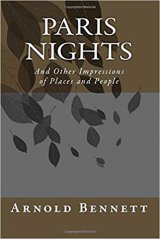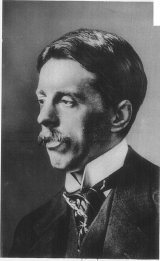Paris Nights and Other Impressions of Places and People Page #12
Enoch Arnold Bennett (27 May 1867 - 27 March 1931) was an English writer. He is best known as a novelist, but he also worked in other fields such as the theatre, journalism, propaganda and films. Bennett was born in a modest house in Hanley in the Potteries district of Staffordshire. Hanley was one of the Six Towns that were joined together at the beginning of the 20th century as Stoke-on-Trent and are depicted as "the Five Towns" in some of Bennett's novels. Enoch Bennett, his father, qualified as a solicitor in 1876, and the family moved to a larger house between Hanley and Burslem.
- Year:
- 1913
- 105,991 Views
V--CAUSE CÉLÈBRE Quite early in the winter evening, before the light had died out of the sky, central Paris was beginning to be pleasurably excited. The aspect of the streets and of the cafés showed that. One saw it and heard it in the gestures and tones of the people; one had a proof of it in oneself. The whole city was in a state of delightful anxiety; and it was happy because the result of the night, whatever fate chose to decide, could not fail to be amusing and even thrilling. All the thoroughfares converging upon the small and crowded island which is the historical kernel of Paris, were busier and livelier than usual. In particular, automobiles thronged--the largest, glossiest, and most silent automobiles, whose horns were orchestras--automobiles which vied with motor-omnibuses for imposingness and moved forward with the smooth majesty of trains. [Illustration: 0091] There came a point, near the twinkling bridges, where progress was impossible, where an impalpable obstacle intervened, and vehicles stood arrested in long treble files, and mysterious words were passed backwards from driver to driver. But nobody seemed to mind; nobody seemed impatient; for it was something to be thus definitely and materially a part of the organised excitement. Hundreds of clever resourceful persons had had the idea of avoiding the main avenues, and creeping up unobserved to the centre of attraction by the little streets. So that all these ancient, narrow, dark lanes that thread between high and picturesque architectures were busy with automobiles and carriages. And in the gloom one might see shooting round a corner the brilliant interior of an automobile, with electric light and flowers and a pet dog, and a couple of extremely fashionable young women in it, their eyes sparkling with present joy and the confident expectation of joy to come. And such young women, utterly correct, were doing the utterly correct thing. But all these little streets led at last to the same impalpable obstacle. So that from a high tower, for instance, the Tour St. Jacques close by, one might have beheld the black masonry of the centre of attraction as it were beleaguered on every side by the attacking converging files that were held back by some powerful word; while the minutes elapsed, and the incandescent signs of shops and theatres increased in the sky, and the Seine, dividing to clasp the island, darkened into a lamp-reflecting mirror along which tiny half-discerned steamers restlessly plied. ***** Despite the powerful word, the Palace of Justice, the centre of attraction, was tremendously alive and gay with humanity. Traffic could not be stopped, and was not stopped, and those who had sufficient energy and perseverance could insinuate themselves into its precincts. The great gold lamps that flank the staircase of honour gleamed upon a crowd continually ascending and descending. The outer hall was full of laughing chatter and of smoke. And barristers, both old and young, walked to and fro in hieratic converse, waving their cigarettes in sober curves, and on every one of their faces as they gazed negligently at the public was the announcement that they could tell “an they would.” All the interminable intersecting corridors were equally vivacious, with their diminishing perspectives of stoves against which groups warmed themselves. Groups of talkers made the circuit of the corridors as it might have been the circuit of a town, passing a given spot regularly, and repeating and repeating the same arguments. And the solemn arched immensity of the Hall of Lost Footsteps was like a Bourse. Here, more than anywhere else, one had the sense of audience-chambers concealed behind doors, where fatal doings were afoot; one had the sense of the terrific vastness and complexity of the Palace wherein scores of separate ceremonious activities simultaneously proceeded in scores of different halls. The general public knew only that somewhere within the Palace, somewhere close at hand, at the end of some particular passage, guarded doors hid the spectacle whose slightest episode was being telegraphed to all the cities of the entire civilised world, and the general public was content, even very content, to be near by. The affair was in essence a trifle; merely the trial of a woman for the murder of her husband. But this woman was a heroic woman; this woman belonged by right of brain and individual force to the great race of Thérèse Humbert. Years before, she had moved safely in the background of a sensational tragedy involving the highest personages of the Republic. And now in the background of her own tragedy there moved somebody so high and so potent that no newspaper dared or cared to name his name. All that was known was that this enigmatic and awful individual existed, that he was involved, that had he been less sublime he would have had to appear before the court, that he would not appear, and that justice would suffer accordingly. In the ordeal of extremest publicity, the woman had emerged a Titaness. Throughout all her altercations with judge, advocates, witnesses, and journalists, she had held her own grandly, displaying not only an astounding force of character, but a superb appreciation of the theatrical quality of her rôle. She was of a piece with yellow journalism, and the multitude that gapes for yellow journalism. She was shameless. She was caught again and again in a net of lies, and she always escaped. She admitted nearly everything: lyings, adulteries, and manifold deceits; but she would not admit that she knew anything about the murder of her husband. And even though it was obvious that the knots by which she was bound when the murder was discovered were not serious knots, even though she left a hundred incriminating details unexplained, a doubt concerning her guilt would persist in the minds of the impartial. She was indubitably a terrible creature, but she was an enchantress, and she was also beyond question an exceedingly able housekeeper and hostess. She might be terrible without being a murderess. And now the trial was closing. The verdict, it was stated, would be rendered that night even if the court sat till midnight. It would be a pity to keep an amiable public, already on the rack of impatience for many days, waiting longer. The time was ripe. Further, the woman had had enough. Her resources were exhausted, and to continue the fight would mean an anti-climax. The woman had completely lost the respect of the public--that was inevitable--but she had not lost its admiration. The attitude of the public was cruel, with the ignoble cruelty which is practised towards women in Latin countries alone; she had even been sarcastically sketched in the most respectable illustrated paper in the attitude of a famous madonna; but beneath the inconceivably base jeers, there remained admiration; and there remained, too, gratitude--the gratitude offered to a gladiator who has fought well and provided a really first-class diversion.
Translation
Translate and read this book in other languages:
Select another language:
- - Select -
- 简体中文 (Chinese - Simplified)
- 繁體中文 (Chinese - Traditional)
- Español (Spanish)
- Esperanto (Esperanto)
- 日本語 (Japanese)
- Português (Portuguese)
- Deutsch (German)
- العربية (Arabic)
- Français (French)
- Русский (Russian)
- ಕನ್ನಡ (Kannada)
- 한국어 (Korean)
- עברית (Hebrew)
- Gaeilge (Irish)
- Українська (Ukrainian)
- اردو (Urdu)
- Magyar (Hungarian)
- मानक हिन्दी (Hindi)
- Indonesia (Indonesian)
- Italiano (Italian)
- தமிழ் (Tamil)
- Türkçe (Turkish)
- తెలుగు (Telugu)
- ภาษาไทย (Thai)
- Tiếng Việt (Vietnamese)
- Čeština (Czech)
- Polski (Polish)
- Bahasa Indonesia (Indonesian)
- Românește (Romanian)
- Nederlands (Dutch)
- Ελληνικά (Greek)
- Latinum (Latin)
- Svenska (Swedish)
- Dansk (Danish)
- Suomi (Finnish)
- فارسی (Persian)
- ייִדיש (Yiddish)
- հայերեն (Armenian)
- Norsk (Norwegian)
- English (English)
Citation
Use the citation below to add this book to your bibliography:
Style:MLAChicagoAPA
"Paris Nights and Other Impressions of Places and People Books." Literature.com. STANDS4 LLC, 2024. Web. 23 Dec. 2024. <https://www.literature.com/book/paris_nights_and_other_impressions_of_places_and_people_110>.




Discuss this Paris Nights and Other Impressions of Places and People book with the community:
Report Comment
We're doing our best to make sure our content is useful, accurate and safe.
If by any chance you spot an inappropriate comment while navigating through our website please use this form to let us know, and we'll take care of it shortly.
Attachment
You need to be logged in to favorite.
Log In